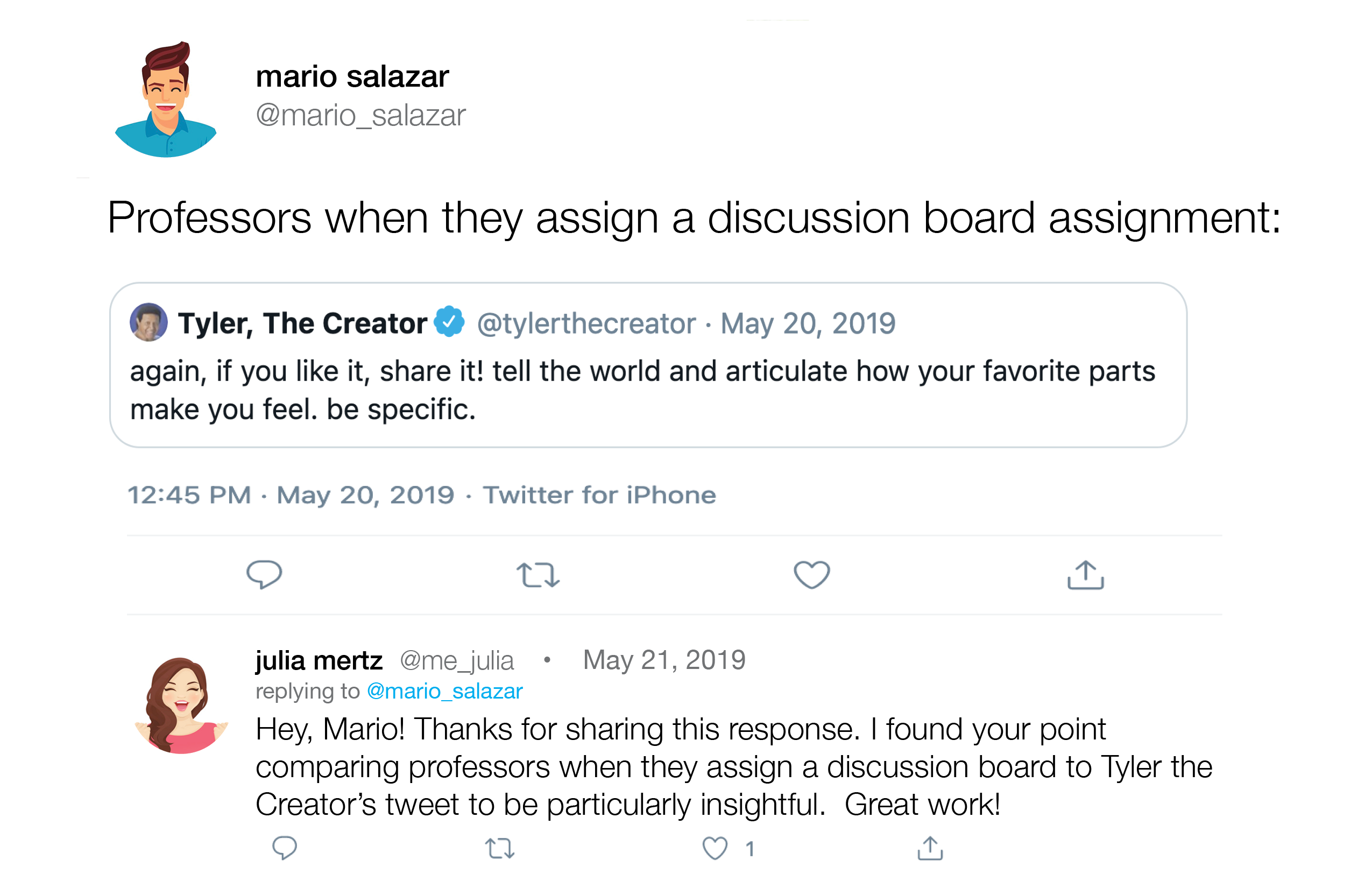Listening to a Train of Thought: Voice Memos as Alternative to Discussion Board Posts
Juan Llamas-Rodriguez / University of Texas at Dallas

Among the first things I dispensed with during the tumultuous move to emergency online course delivery was the discussion board post. Back in March 2020, amid the frenzy of figuring out life under lockdown and reading dozens of online teaching how-to guides, I opted to give everyone in my undergraduate course full marks on the discussion board post assignment. This took one weekly stressor off their plate and allowed them to focus on the main projects of the latter half of the course. The students’ comments at the end of the semester revealed that they appreciated this move. All in all, I realized that we had still achieved the learning goals of the course despite forgoing the discussion boards. Maybe it was time to replace that assignment altogether.
Already much maligned by students for seeming like busywork, discussion board assignments are also a significant burden for instructors. If you hope to provide helpful feedback on each student post, reading and responding to dozens of mini-essays every week ends up amounting to twice the number of hours it takes to plan course lessons. By the middle of the semester, students are tired of writing them and professors are tired of reading them. Further, the cumulative work burden and frustration with the assignment leads students to find creative ways to sidestep its core learning objectives. I have observed students rephrasing random passages from an assigned reading, superficially engaging with material by designating everything as “interesting,” or “responding” to their peers simply by agreeing. If these memes are any indication, such strategies are not uncommon across the board.

I have tried many different ways to spruce up this assignment over the years. Sometimes, I split up the class into groups and assigned alternate weekly posting duties, so only a few students wrote a long post and the rest responded to ideas raised in the long posts. Other times, I would have specific prompts and questions to answer instead of asking generally for “a 500-word response.” These alternative versions worked to various degrees, but the issues mentioned above continued. I briefly considered trying one of the “new approaches to discussion boards” that Inside Higher Ed shared in 2019, but ultimately decided against it. If the scramble to transition courses online offered the opportunity to interrogate old practices, there was no better time to reimagine the discussion board.
The first step to consider is the purpose of the discussion board assignment. If it is to ascertain whether or not students do the required reading for the week, frankly I do not care about this. When students do not do the required reading for any given week, I can assume (a) that their life is busy at the moment with other duties like jobs or personal issues; or (b) that they don’t care. Forcing students to do a graded weekly writing assignment will not alleviate (a) and will certainly not move the needle on (b). A more generous way of articulating this learning objective is to say that the discussion board post aims to assess what and how the students are comprehending the assigned materials, and to help the instructor tailor the class activities and lectures to address any gaps, misunderstandings, and lingering questions. This was the central goal for me, and thus I focused on an alternative that could fulfill this aspect.
Another objective of discussion boards could be to encourage short weekly writing exercises, which demystify the process of writing and may form the building blocks for a final term paper. This aspect of the assignment is key for graduate seminars and certain writing intensive undergraduate courses. In my case, I have piloted the alternative in undergraduate theory-heavy classes: first, in my fall 2020 Networked Identities class, a new media and identity course that revolves around the notion of “the voice” as a sociopolitical construct in various aural media; and then, in my spring 2021 Critical Media Theories class. Previously I had redesigned both these courses to not include a long final term paper and instead feature several shorter writing assignments throughout the term. As such, the alternative assignment needed to function as an opportunity to practice explaining the theory concepts of the week, albeit not necessarily in writing.
Finally, the discussion board post also serves as a starting point for the conversation that will continue during synchronous class sessions. When successful, discussion board threads create a true conversation between course participants. As I mentioned earlier, these conversations can quickly break down when students lack the time or energy to dedicate significant time to the assignment, something I suspected would be intensified during the COVID-19 pandemic. Likewise, for fully online, asynchronous courses, discussion posts fulfill the requirement of having weekly interactions among students and the instructor. Since my classes had a synchronous meeting and featured regular group work activities, I did not need the discussion board alternative to fulfill this goal initially. In subsequent iterations, I hope to re-insert that conversational aspect into the assignment.
Based on the objectives of assessing how students grasped the week’s materials and enabling me to address gaps and lingering questions, I devised an alternative assignment called the Weekly Insight Memo. It consists of short 1-to-2-minute voice memos that students can record on their phone or computer and upload to the learning management system. There should be no direct quotes from the readings, only a summary of the readings’ main ideas in the student’s own words. In order to encourage students to not worry about being wrong in expressing their understanding of (sometimes) complicated material, I grade the assignment as Credit/No Credit, and offer them the opportunity to miss a handful of weeks without a grade penalty.

The Weekly Insight Memo has succeeded admirably in its first learning goal. Alleviating the pressure to compose fully articulated thoughts in writing seems to facilitate (sometimes unexpected) connections between the different assigned materials. Some students opt to write down what they are going to say before they say it — I can often tell from their delivery and word choices — but the vast majority seem to press record and let themselves go off for a couple of minutes. As students remind themselves of what they just read, they tend to realize, in real time, the takeaways of those readings.[1] It is like listening to a train of thought as it begins to gain speed.
Further, after listening to ~30 voice memos before preparing for class (labor time: 1 hour), I quickly notice trends in what caught students’ attention and what did not, which concepts remain unclear, and how often students are building on the material from previous weeks. I make brief notes on particular comments and bring these up in class, both to acknowledge that I have listened to their submissions — that their work was not in vain — and to position these as the start of a longer conversation that the class session intends to extend.
This new format has also granted me unexpected insight into students’ preferences for specific topics and the popular media examples that speak to these topics. Some students remarked their love for the on-air personality of Shereen Marisol Meraji, co-host of the Code Switch podcast, and their surprise at discovering the standup comedy of DJ Demers. The more casual conversational style of the assignment also allows students to incorporate detailed anecdotes about their life that connected to topics in the class. One student in my Networked Identities class would constantly draw from experiences at his full-time job at a hardware store to illustrate how concepts like code-switching and vocal fry helped him make sense of customer interactions. These examples demonstrated to me that he was thinking through these ideas and, by mid-semester, painted a detailed picture of the kinds of characters and situations that frequented that hardware store. The week when we examined autistic forms of expression was particularly notable for how many students brought in their own experiences: talking about a sibling, cousin, or child on the autism spectrum and acknowledging the new vocabulary they possessed to engage critically with various mainstream responses to autism. Overall, these off-the-cuff comments reveal an important aspect of learning: making deep connections between the material and the learner’s life.
I should note that I do offer an alternative to the Weekly Insight Memo. Students who would prefer not to record their voices have the option to submit a 300-word written reflection instead. Although I explain the learning goals of the assignment and why I think it is an effective way to get students to think through the course’s concepts, I introduce the written option as my way of making sure the class remains accessible and responsive to different learning contexts. Students may choose this option for a variety of reasons: anxiety, self-consciousness over accents, concerns over lack of privacy, etc. I do not ask them to justify why they are choosing the alternate option; I merely request that they let me know their preference for it.
Ultimately, the voice memo assignment has functioned as a way to forge closer connections with students despite the forms of separation necessitated by the health crisis. While writing this column, I keep thinking back to Sarah Murray’s work on how podcasts’ specific sonic aesthetics, borrowed from earlier radio practices, build a sense of intimacy.[2] In these voice memos, students are addressing a public of one — just me — yet that dynamic of intimacy remains. Teaching in the midst of a pandemic has reminded us of how vital these small yet deep forms of interpersonal connection are, not only for creating an inviting classroom space but also for maintaining our sense of interrelation with the world. Amid the growing sense of isolation during lockdowns, these memos helped me build such interpersonal connections with the people on the other side of the Zoom avatar.
Image Credits:
- Voice Recording has become popularized with easy to use Smart Phone Apps.
- A former student’s Tweet (recreated to protect the anonymity of the student) (Author’s Screengrab)
- Description of the Weekly Insight Memo from my Critical Media Theories Spring 2021 syllabus. (Author’s Screengrab)
- When I shared on Twitter last fall that I was piloting this assignment, other instructors agreed they have also noticed students become more thoughtful and invigorated in audio essays than they are in writing. [↩]
- Sarah Murray, “Coming-of-age in a coming-of-age: the collective individualism of podcasting’s intimate soundwork,” Popular Communication 17.4 (2019): 301-316. doi: 10.1080/15405702.2019.1622117 [↩]
Thank you for this. I’m looking forward to trying it as part of varying weekly assignments I assign to students in our Introduction to Television and Digital Media course.